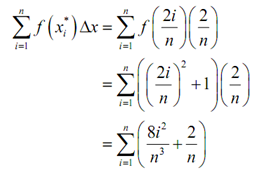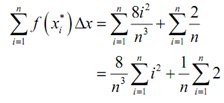Using the definition of the definite integral calculate the following.
∫02 x2 + 1dx
Solution
Firstly, we can't in fact use the definition unless we find out which points in each interval that well use for xi* . To make our life simple we'll utilizes the right endpoints of each interval.
We know that for general n the width of each subinterval is,
Δx = 2 - 0/n = 2/n
The subintervals are then,
[0, 2/n] , [2/n , 4/n ] [ 4/n 6/n] .......[ 2 (i -1)/n ,2i/n],...,[2(n-1)/n , 2]
Since we can see the right endpoint of the ith subinterval is
x i * = 2i/n
The summation in the definition of the definite integral is then,
Now, we have to take a limit of this. That means that we need to "evaluate" this summation..
In order to do this we will have to recognize that n is a constant so far as the summation notation is concerned. Since we cycle through the integers from 1 to n in the summation only i changes & therefore anything that isn't an i will be a constant and can be factored out of the summation. In specific any n that is in the summation can be factored out if we have to.
Following is the summation "evaluation".

=8/n3 (( n ( n + 1) ( 2n + 1) )/6 )+(1/n) (2n )
= (4 ( n + 1) ( 2n + 1))/3n2 )+ 2)
= (14n2 + 12n + 4)/3n2
Now we can determine the definite integral.
=14/3
